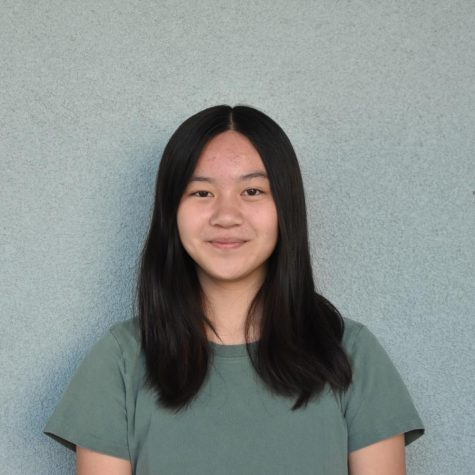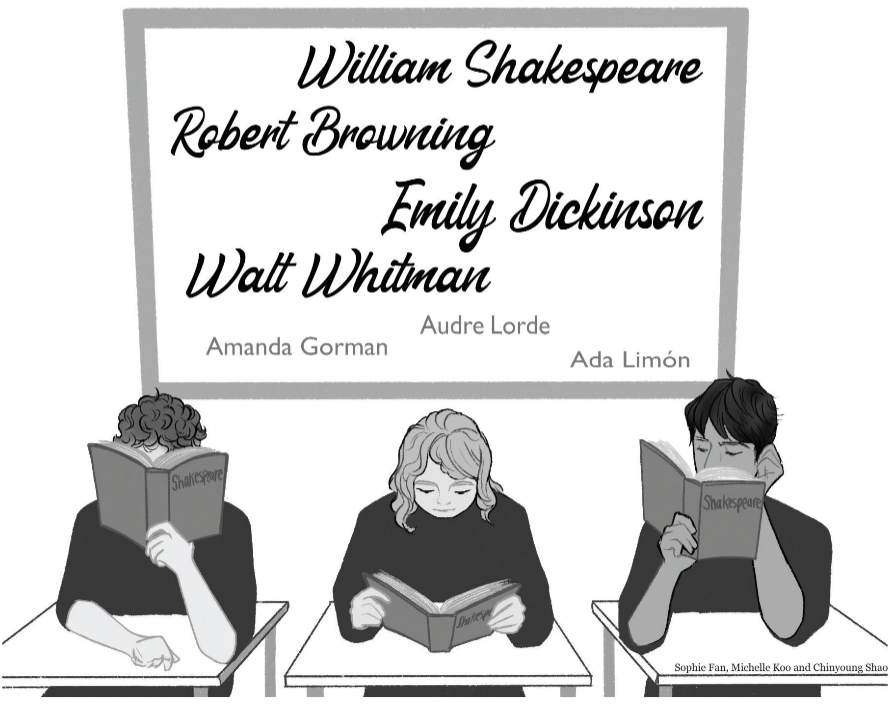Incorporating modern poetry into the English curriculum offers alternative perspective to students
In a typical English class at Gunn, the poetry studied is often written centuries ago. Students find themselves deconstructing Shakespeare’s sonnets, parsing out Whitman and learning the styles and devices of old poetry. Modern poetry, which is broadly defined as poems written in the 21st century, covers current viewpoints. Although older poetry is critical to demonstrate the fundamentals of poetry such as meter and structure, expanding the English curriculum to include modern poetry would expose students to diverse perspectives and new styles of storytelling.
Poetry can make even the most mundane events seem extraordinary and often illuminates human experiences in a way that people rarely consider in their daily lives. However, exclusively covering classical poetry often means western-centric, male focused idealizations and viewpoints are overrepresented. The overwhelmingly white, male poets of the past cannot speak on the experiences that women, racial minorities and other marginalized groups face today. Essentially, modern poetry provides valuable insight into experiences that have rarely been highlighted in the past.
Due to changing times and mindsets, more and more members of these marginalized groups have risen to prominence as modern poets. Most notably, National Youth Poet Laureate Amanda Gorman recited her poem “The Hill We Climb” at President Joe Biden’s inauguration. The poem spoke to Gorman’s experiences as a Black woman in America and commented on recent political upheaval, calling for unity.
Modern poets Ada Limón and Audre Lorde have also discussed issues such as misogyny, racism and inequality in their works. For example, in her poem “Wife,” Limón challenges the patriarchal mindset of marriage and confronts her own complicated relationship with the term “wife.” In her poem “Power,” Lorde examines police brutality, the injustices of the criminal justice system and her own rage in response to the murder of a 10-year-old Black boy by a white police officer. Introducing more modern perspectives into the English curriculum would allow students to broaden their worldviews. Poetry is diverse, and so are the people who write it.
Additionally, reading modern poetry can expose students to new forms of expression. Modern poets are breaking traditional boundaries to shape new literary mediums, including spoken word and digital poetry. These new and creative styles can inspire students as well. In her 2011 Ted Talk, spoken word poet Sarah Kay discussed how spoken word poetry was not made to remain still on paper. It demands to be heard out loud and witnessed in person. Spoken word poetry can carry deep emotional weight with intonation and movement, untethered from the constraints of written words on a page. Digital poetry, which uses computer features such as animation and coding to interact with the text, allows for a multimedia poetry experience without taking away from the work’s true purpose: to communicate. Incorporating the creative mindset of modern poetry into the English curriculum can show students that poetry is more than a strict set of rules, a definitive rhyme scheme or a certain number of stanzas; rather, poetry can be dynamic, fun and engaging without losing any of its meaning.
Granted, there is value in learning traditional poetry written by the likes of Shakespeare and Whitman. Older poetry laid the foundation for centuries of poetic innovation and remains vital in providing key insight into historical perspectives. The problem arises when these historical perspectives are the only ones taught in English classes, at the expense of modern ideas that may be more relevant to today’s world. The English curriculum should not exclude older poetry, but rather expand to include newer viewpoints along with the old.
To quote Robin Williams’s character from the movie Dead Poets Society, “We do not read and write poetry because it’s cute. We read and write poetry because we are members of the human race.” As the human race is constantly evolving, so too must our poetry. Social opportunities in our current age have led to an influx of modern poets who do not fit the mold of historical poets; the advancements of innovation and technology have called for newer mediums to display poets’ work. Yet the crux of poetry remains: to place the best words in the best order and to present an uncommon look at a common experience. Older poetry provided us with a starting point, but only modern poetry can demonstrate how these principles are relevant to us today.
Your donation will support the student journalists of Henry M. Gunn High School. Your contribution will allow us to purchase equipment and cover our annual website hosting costs.

On staff since January 2021, junior Carly Liao is a Forum editor for The Oracle. Outside of the newspaper, she enjoys running, doing crossword puzzles...


